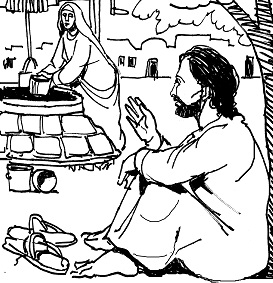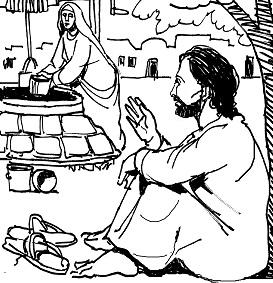

“Whoever drinks the water I give will never thirst again” (John 4:14).
Third Sunday of Lent
Exod 17:3-7; Rom 5:1-2, 5-8; John 4:6-42
Our parish will suspend offering the cup as part of Communion this weekend, a small but significant signal that national preparedness for the pandemic will be reaching into many aspects of our lives in the coming weeks. While the reception of the Eucharist has already been reduced to a wafer and a sip, not having the cup puts the question to us just how thirsty we are for this intimate encounter with the risen Christ.
As moral criteria are debated by some bishops about who should be allowed to receive Communion, one suggestion is that the Eucharist is for those who are hungry and thirsty for the body and blood of Jesus, those for whom it is a matter of life and death. As Pope Francis has argued, Communion is not a reward for the righteous but medicine for sinners.
Though she did not know it, this was the desperate state of the Samaritan woman who encountered Jesus at the well of Jacob. Her dialogue with Jesus was a model for Christian Initiation, drawing her from human need to spiritual fulfillment. She had been coming each day to draw water with a bucket. Jesus offered her a continuous spring welling up from within. It satisfies our deepest thirst of all—for eternal life.
The encounter with the Samaritan woman began because Jesus was thirsty. His thirst was for the salvation of the woman before him. His mission was to transform the desert of human alienation and sin into the promised garden of God’s creation. The Gospel of John will return to the theme of thirst in Chapter 19, when Jesus fulfills his mission with the words from the cross, “I am thirsty!” His thirst for us is our thirst for him, the only source that can satisfy our longing for love.
In this final sign in John’s fugue of I AM sayings, Jesus’ death will result in a living spring of blood and water from his pierced heart, the gifts of Baptism and Eucharist as the key sacraments of Initiation. To receive them is to become one with Jesus in his death and resurrection, the path to eternal life.
The woman at the well, a double outcast by the Jews for her apostasy and by her village neighbors for her multiple marriages, is chosen by Jesus to be one of his first Apostles, an evangelist to the Samaritan community and a witness to all who read this Gospel story. She summons us today to bring our thirst to the well, never satisfied for anything less than living water, direct and intimate contact with the Source of life.
May our thirst deepen during this time of anxiety and active concern for one another as our world faces a deadly crisis. May our prayer for healing intensify toward the day when together we can again receive the cup.
Advertisement








